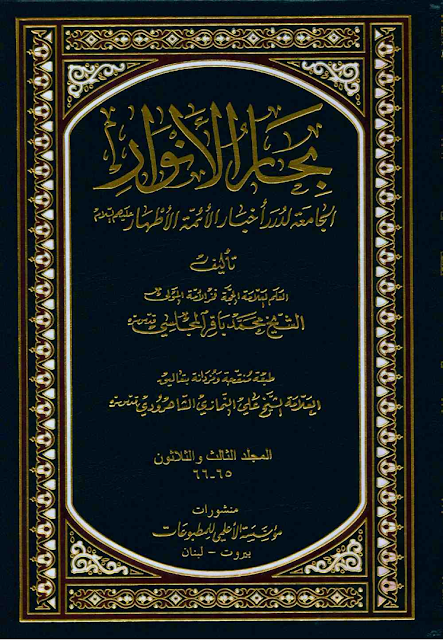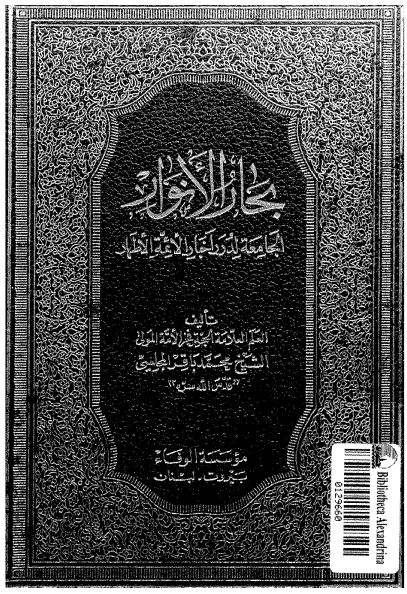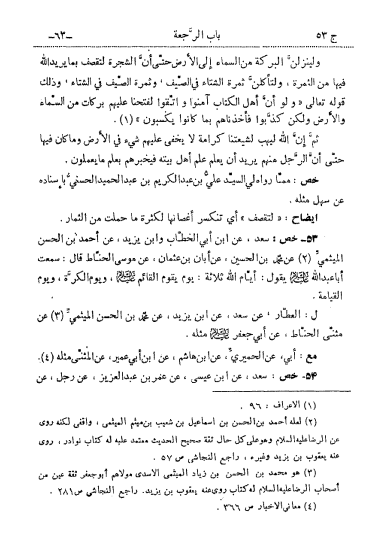918 (74) (From
"al-Kafi" volume 2, "Usul" section) - (Muhammad ibn Yahya,
commented) from Ahmad ibn Muhammad from al-Husayn ibn Sa'id from someone he
mentioned from 'Ubayd ibn Zararah from Muhammad ibn Marid who said: I said to
Abu Abdullah (peace be upon him), "A hadith has been narrated to us that
you said, 'If you know, then do what you wish.'" He (peace be upon him)
replied, "I said that." I asked, "Even if they commit adultery,
steal, or drink alcohol?" He said to me, "Indeed, to God we belong
and to Him we shall return. By God, they have not treated us fairly. We are
held accountable for actions, while it is excused for them? What I said was,
'If you know, then do what you wish of little good or much, for it will be
accepted from you.'"
919 (75) (From "Ma'ani
al-Akhbar" page 56) - Abi (may God be pleased with him) said: Sa'd ibn
Abdullah narrated to us from Ahmad ibn Muhammad ibn Isa from his father from
Ali ibn al-Nu'man from Fudayl ibn 'Uthman who said: Abu Abdullah (peace be upon
him) was asked, and it was said to him, "These wicked people narrate from
your father, saying that your father (peace be upon him) said, 'If you know,
then do what you wish,' and they permit after that every forbidden act."
He (peace be upon him) said, "What is the matter with them, may God curse
them. My father (peace be upon him) only said, 'If you know the truth, then do
what you wish of good, for it will be accepted from you.'"
920 (76) (From "Ma'ani
al-Akhbar" page 110) - Muhammad ibn al-Hasan ibn Ahmad ibn al-Walid (may God
be pleased with him) said: Muhammad ibn al-Hasan al-Saffar narrated to us,
saying: Ahmad ibn Muhammad ibn Isa narrated to us from Muhammad ibn Abi 'Umayr
from some of his companions from Abu Abdullah (peace be upon him) who said: It
was said to him, "Abu al-Khattab narrates from you that you said to him,
'If you know the truth, then do what you wish.'" He (peace be upon him)
said, "May God curse Abu al-Khattab. By God, I did not say that to him.
Rather, I said to him, 'If you know the truth, then do what you wish of good,
for it will be accepted from you.' Indeed, God the Almighty says, 'Whoever does
righteous deeds, whether male or female, and is a believer, they will enter
Paradise and will be provided for without account.' And He says, 'Whoever does
righteous deeds, whether male or female, and is a believer, We will give them a
good life.' A similar narration is found in the traditions of 'al-Da'aim' in
the nineteenth chapter." [Jami' Ahadith
al-Shi'ah, Volume 1, Page 560]
918 (74) كا 464 - ج 2 - أصول - (محمد بن يحيى - معلق) عن أحمد بن محمد عن الحسين بن سعيد عمن ذكره عن عبيد بن زرارة عن محمد بن مارد قال قلت لأبي عبد الله عليه السلام حديث روى لنا أنك قلت إذا عرفت فعمل ما شئت فقال عليه السلام قد قلت ذلك قال قلت وأن زنوا أو سرقوا أو شربوا الخمر فقال لي إنا لله وإنا إليه راجعون والله ما أنصفونا أن نكون أخذنا بالعمل ووضع عنهم انما قلت إذا عرفت فاعمل ما شئت من قليل الخير وكثيرة فإنه يقبل منك.
919 (75) المعاني 56 - أبى ره قال حدثنا سعد بن عبد الله عن أحمد بن محمد بن عيسى عن أبيه عن علي بن النعمان عن فضيل بن عثمان قال سئل أبو عبد الله عليه السلام فقيل له ان هؤلاء الأخابث يروون عن أبيك يقولون ان أباك عليه السلام قال إذا عرفت فاعمل ما شئت فهم يستحلون بعد ذلك كل مجهل (محرم - خ ل) قال مالهم لعنهم الله انما قال أبى عليه السلام إذا عرفت الحق فاعمل ما شئت من خير يقبل منك.
920 (76) المعاني 110 - حدثنا محمد بن الحسن بن أحمد بن الوليد رض قال حدثنا محمد بن الحسن الصفار قال حدثنا أحمد بن محمد بن عيسى عن محمد بن أبي عمير عن بعض أصحابه عن أبي عبد الله عليه السلام قال قيل له ان ابا الخطاب يذكر عنك انك قلت له إذا عرفت الحق فاعمل ما شئت فقال لعن الله ابا الخطاب والله ما قلت له هكذا ولكني قلت له إذا عرفت الحق فاعمل ما شئت من خير يقبل منك أن الله عز وجل يقول من عمل صالحا من ذكرا وأنثى وهو مؤمن فأولئك يدخلون الجنة يرزقون فيها بغير حساب ويقول تبارك وتعالى من عمل صالحا من ذكرا وأنثى وهو مؤمن فلنحيينه حياة طيبة ويأتي نحوه في رواية الدعائم من الباب التاسع عشر.


21 - (From "Illal al-Sharai'") - Majilwayh narrated from his uncle from Muhammad ibn Ali al-Kufi from Muhammad ibn Sinan from Sabah al-Mada'ini from al-Mufaddal ibn 'Umar that Abu Abdullah (peace be upon him) wrote a letter to him in which he stated: "Indeed, God the Almighty has never sent a prophet who calls to the knowledge of God without also calling to obedience in command and prohibition. God only accepts from the servants the performance of the obligatory duties which He has enjoined according to their limits, along with the knowledge of the one who calls to Him. Whoever obeys, forbids the forbidden outwardly and inwardly, prays, fasts, performs Hajj and 'Umrah, reveres all the sanctities of God, does not neglect anything of them, performs all acts of goodness and noble ethics, and avoids their bad traits. Whoever claims that he can permit the lawful and prohibit the forbidden without the knowledge of the Prophet (peace be upon him and his family), has not permitted the lawful for God nor prohibited the forbidden for Him. Even if he prays, gives charity, performs Hajj and 'Umrah, and does all that without the knowledge of the one whom God has enjoined obedience to, he has done nothing. He has neither prayed, fasted, given charity, performed Hajj nor 'Umrah, washed from impurity, purified himself, forbidden the forbidden for God, nor permitted the lawful for Him. He has no prayer, even if he bows and prostrates, no charity, and no Hajj. All of that is only accepted with the knowledge of a man from God the Almighty to His creation by his obedience and order to follow him. Whoever knows him and follows him obeys God. Whoever claims that it is only knowledge and that if he knows, it suffices without obedience, has lied and associated others with God. Rather, it was said: 'Know and do what you wish of good, for it will not be accepted from you without knowledge. If you know, then do for yourself what you wish of obedience, little or much, for it will be accepted from you.'" [Bihar al-Anwar, Volume 27-28, Page 106-107]
21 - علل الشرائع: ماجيلويه عن عمه عن محمد بن علي الكوفي عن محمد بن سنان عن صباح المدائني (4) عن المفضل بن عمر أن أبا عبد الله عليه السلام كتب إليه كتابا فيه: إن الله عز - وجل لم يبعث نبيا قط يدعو إلى معرفة الله ليس معها طاعة في أمر ولا نهي، وإنما يقبل الله من العباد العمل بالفرائض التي افترضها (5) الله على حدودها مع معرفة من دعا إليه، ومن أطاع حرم الحرام ظاهره وباطنه (6) وصلى وصام وحج واعتمر وعظم حرمات الله كلها لم يدع منها شيئا وعمل بالبر كله ومكارم الأخلاق كلها وتجنب سيئها.
ومن زعم أنه يحل الحلال ويحرم الحرام بغير معرفة النبي صلى الله عليه وآله لم يحل لله حلالا ولم يحرم له حراما وإن من صلى وزكى وحج واعتمر وفعل ذلك كله بغير معرفة من افترض الله عليه طاعته فلم يفعل شيئا من ذلك لم يصل ولم يصم ولم يزك ولم يحج ولم يعتمر ولم يغتسل من الجنابة ولم يتطهر ولم يحرم لله حراما ولم يحل لله حلالا، ليس له صلاة وإن ركع وإن سجد، ولا له زكاة ولا حج، وإنما ذلك كله يكون بمعرفة رجل من الله جل وعز على خلقه بطاعته وأمر بالأخذ عنه.
فمن عرفه وأخذ عنه أطاع الله، ومن زعم أن ذلك إنما هي المعرفة وأنه إذا عرف اكتفى بغير طاعة فقد كذب وأشرك، وإنما قيل: اعرف واعمل ما شئت من الخير فإنه لا يقبل منك ذلك بغير معرفة، فإذا عرفت فاعمل لنفسك ما شئت من الطاعة قل أو كثر فإنه مقبول منك (1).





























